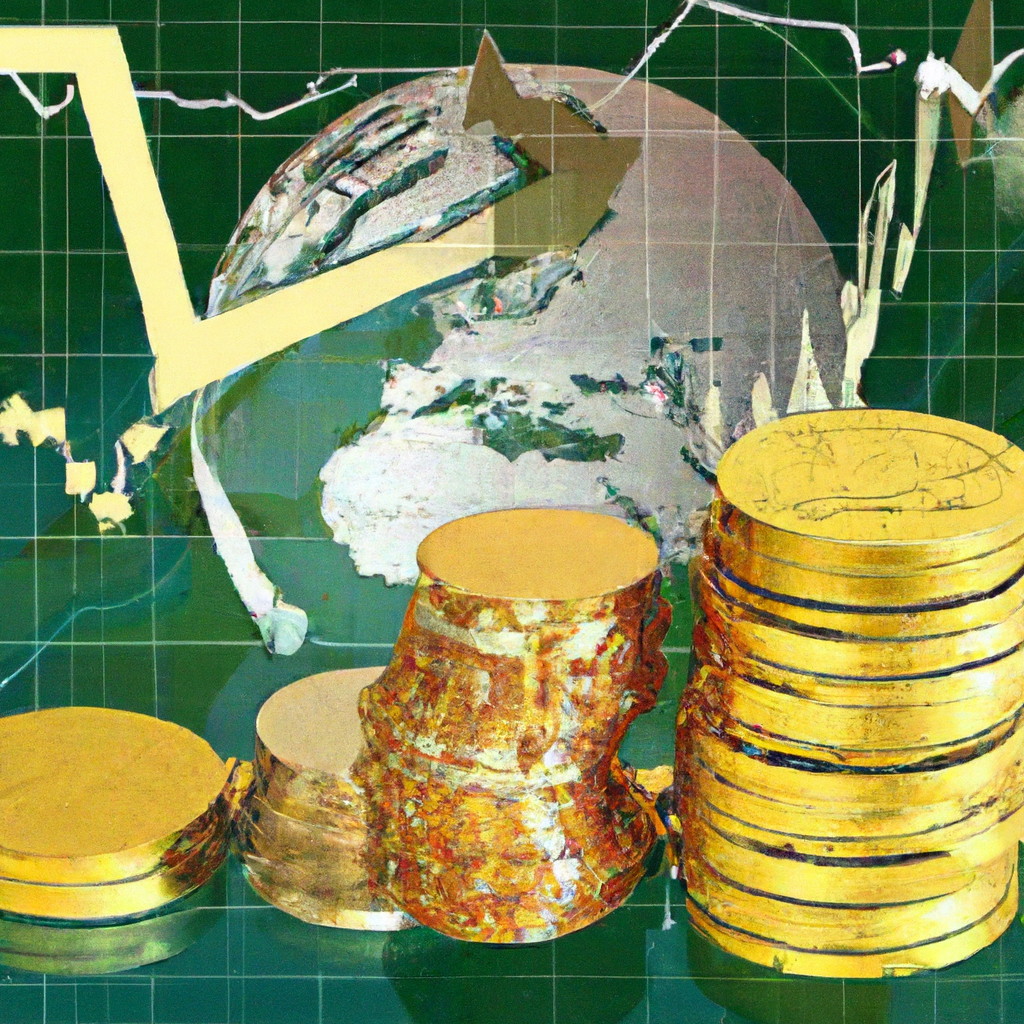Curious about the risks of investing in gold during economic uncertainties in Malaysia? Look no further! In this article, we will explore the potential pitfalls and challenges that come with investing in gold when the economy is uncertain. As a fund manager and gold investment expert, I will break down the risks and provide you with valuable insights on how to navigate these uncertain times. So grab a cup of coffee, sit back, and let’s dive into the world of gold investing in Malaysia!

Volatility of Gold Prices
Historical Price Fluctuations
Gold has long been regarded as a safe haven investment during times of economic uncertainty. However, it is important to understand the volatility of gold prices before making any investment decisions. Historically, gold prices have experienced significant fluctuations, both in the short term and the long term. These fluctuations can be attributed to various factors, such as global economic conditions, demand and supply dynamics, currency exchange rates, regulatory issues, and geopolitical risks.
Global Economic Factors
One of the key drivers of gold price volatility is global economic factors. Economic downturns, such as recessions or financial crises, tend to increase the demand for gold as investors seek a safe haven for their capital. On the other hand, periods of economic growth and stability may reduce the demand for gold, leading to a decrease in prices. Factors such as GDP growth, inflation rates, employment levels, and consumer confidence can all impact the global economy and, subsequently, gold prices.
Demand and Supply
The demand and supply dynamics of gold also play a significant role in its price volatility. The demand for gold is influenced by various factors, including jewelry consumption, central bank purchases, investment demand from individuals and institutions, and industrial use. On the supply side, gold mining production, recycling, and central bank gold sales can all impact the availability of gold in the market. Any imbalances or changes in these demand and supply factors can lead to fluctuations in gold prices.
Currency Exchange Rates
Currency exchange rates have a direct impact on the price of gold. Since gold is priced in US dollars, changes in currency exchange rates can influence the purchasing power of investors from different countries. For example, a weaker US dollar can make gold more affordable for investors using other currencies, leading to an increase in demand and, consequently, an increase in gold prices. Conversely, a stronger US dollar can have the opposite effect.
Regulatory Issues
Government Policies and Regulations
Gold investments can be affected by government policies and regulations, both domestically and internationally. Governments have the power to implement regulations that either promote or restrict gold trading and investment activities. Changes in tax laws, import and export controls, licensing requirements, and restrictions on gold ownership can impact the ease and cost of investing in gold. It is important to stay informed about any potential regulatory changes that may affect the gold market before making investment decisions.
Import and Export Controls
In some countries, there may be restrictions on the import and export of gold. This can have implications for the availability of gold in the local market and may affect the price of gold. Import controls can limit the supply of gold, potentially leading to higher prices domestically. Similarly, export controls can impact the global supply of gold, which can have broader implications for international gold prices.
Taxation and Duties
Taxation and duties imposed on gold investments can also impact the profitability of such investments. Different countries have different tax regimes for gold, including capital gains tax, wealth tax, and value-added tax (VAT). These taxes can increase the cost of owning and selling gold, thereby reducing the overall return on investment. Investors should carefully consider the tax implications of gold investments in their respective jurisdictions.

Counterparty Risks
Investing in Gold ETFs
Investors who choose to invest in gold through Exchange-Traded Funds (ETFs) are exposed to counterparty risks. When investing in a gold ETF, investors do not own physical gold but rather hold shares in the trust that owns the gold. In this case, the value of the investment is dependent on the performance of the ETF and its underlying assets. If the ETF issuer or custodian encounters financial difficulties or fails to meet its obligations, investors may face losses. It is important to carefully assess the credibility and financial stability of the ETF issuer before investing.
Gold Certificates and Accounts
Similar to gold ETFs, investing in gold certificates or holding gold in a bank account also exposes investors to counterparty risks. These investments represent a claim on the underlying physical gold held by a third party. If the issuer or custodian of the certificates or accounts encounters financial difficulties, investors may face challenges in accessing their gold or may even face a loss of investment. Due diligence should be conducted to ensure the credibility and reliability of the issuing institution.
Storage and Custodian Risks
Investors who opt for physical gold investments need to consider the risks associated with storage and custodianship. Whether storing gold at home or using professional vaulting services, there is always a risk of theft or damage. It is crucial to choose secure storage facilities and maintain adequate insurance coverage to protect against such risks. Additionally, the reliability and reputation of custodians should be carefully evaluated to ensure the safety of the gold holdings.
Liquidity Concerns
Market Accessibility
Investors should be aware of the liquidity of the gold market before making any investment decisions. While gold is generally considered a highly liquid asset, there may be limitations in terms of accessing the market during certain times or in specific regions. For example, during times of extreme market volatility or economic crises, liquidity in the gold market may be reduced, making it challenging to buy or sell gold at desired prices. Consideration should be given to factors such as trading hours, transaction costs, and market depth.
Market Depth
The depth of the gold market refers to the volume of trading activity and the number of participants in the market. A deep and liquid market allows for easy buying and selling of gold without significantly impacting its price. However, in markets with limited depth, even small trades can have a significant impact on gold prices. This can lead to higher volatility and potentially unfavorable trading conditions. It is important to assess the depth of the gold market before entering into any trades.
Buyer Pool
The existence of a diverse and robust buyer pool is crucial for maintaining liquidity in the gold market. If there is a lack of buyers, it may be difficult to sell gold quickly and at a fair price. In certain regions or markets, the buyer pool may be smaller, limiting the trading opportunities for investors. The availability of buyers, both institutional and individual, should be considered when evaluating the liquidity of the gold market.

Inflation and Interest Rates
Impact of Inflation on Gold Prices
Inflation can have a significant impact on the price of gold. Traditionally, gold has been seen as a hedge against inflation, meaning that its value tends to rise as the purchasing power of fiat currencies decreases. During periods of high inflation, investors often turn to gold as a store of value, leading to an increase in demand and, consequently, an increase in gold prices. However, it is important to note that the relationship between inflation and gold prices is not linear and can be influenced by various other factors.
Interest Rate Movements
Interest rates play a crucial role in determining the opportunity cost of holding gold. When interest rates are low, the opportunity cost of holding gold, which does not offer any yield, is relatively low, making gold a more attractive investment. Conversely, when interest rates rise, the opportunity cost of holding gold increases, potentially reducing its demand and leading to lower prices. The relationship between interest rates and gold prices is complex and can be influenced by other economic factors as well.
Central Bank Actions
Central banks’ monetary policies and actions can impact both inflation and interest rates, thereby influencing gold prices. Central banks have the power to manipulate interest rates, intervene in currency markets, and implement quantitative easing, among other measures. These actions can have a significant impact on investor sentiment and can drive demand for gold as a hedge against currency depreciation or inflation. Investors should closely monitor central bank policies and actions for potential impacts on the gold market.
Currency Depreciation
Foreign Exchange Fluctuations
Currency depreciation can significantly impact the price of gold. As the value of a currency declines, it takes more units of that currency to purchase an ounce of gold, leading to an increase in gold prices. This relationship is particularly relevant for investors in countries with weaker currencies. Additionally, fluctuations in currency exchange rates can create arbitrage opportunities, leading to short-term fluctuations in gold prices.
Import and Export Dynamics
Changes in import and export dynamics can also influence the relationship between currency depreciation and gold prices. For countries that are major importers of gold, a depreciation in their currency can lead to higher import costs, potentially affecting the local price of gold. On the flip side, countries that are major exporters of gold may benefit from a depreciation in their currency, as it can lead to increased competitiveness in the global market and potentially higher export volumes.
Currency Controls
In some countries, governments may impose currency controls to restrict the outflow of capital or stabilize their currency. These controls can limit the ability of investors to buy or sell gold using foreign currencies or transfer funds internationally. Currency controls can create additional hurdles for gold investors and may affect the liquidity and pricing of gold in the local market. Investors should stay informed about any potential currency control measures that may impact their ability to invest in gold.

Geopolitical Risks
Trade Wars and Tariffs
Geopolitical risks, such as trade wars and tariffs, can have significant repercussions on the global economy and, consequently, on gold prices. Trade disputes between major economies can create uncertainty and volatility in financial markets, driving investors towards safe haven assets like gold. Tariffs imposed on imports can disrupt global supply chains and impact various industries, leading to economic slowdowns and potential impacts on gold demand. Investors should closely monitor geopolitical developments for potential impacts on gold prices.
Political Stability
Political stability or instability in a country can also impact the price of gold. During periods of political uncertainty, investors may seek the safe haven properties of gold as a store of value. Factors such as elections, regime changes, geopolitical tensions, or civil unrest can create volatility in financial markets and increase demand for gold. Conversely, political stability can reduce the appeal of gold as a safe haven asset, potentially leading to lower prices.
Global Conflicts
Global conflicts, such as wars or geopolitical tensions, can have profound effects on the price of gold. These events can create uncertainty and risk aversion among investors, leading to an increase in demand for gold. The perception of gold as a safe haven asset during times of conflict can result in higher prices. It is important for investors to stay informed about geopolitical developments that may impact global stability and ultimately affect gold prices.
Emerging Market Concerns
Currency Volatility
Investing in gold in emerging markets can be particularly challenging due to increased currency volatility. Emerging market currencies tend to be more susceptible to fluctuations in global financial markets, leading to increased risks for gold investors. Currency devaluations or sudden changes in exchange rates can impact the profitability of gold investments in these markets. It is important to carefully assess currency risks before investing in gold in emerging markets.
Sovereign Debt Risks
Emerging markets may also be exposed to higher levels of sovereign debt risk compared to developed economies. A country’s ability to service its debt can impact investor confidence and lead to shifts in capital flows. In times of sovereign debt concerns, investors often turn to safe haven assets like gold, potentially increasing demand and driving up prices. However, a country’s debt situation can also impact its currency and overall economic stability, which can have indirect effects on gold prices.
Capital Outflows
Emerging markets often experience periods of capital outflows, where investors withdraw funds from these markets and seek safer havens. Capital outflows can weaken domestic currencies and create economic instability. These factors can impact the price of gold in emerging markets and may create opportunities or risks for investors. It is essential to closely monitor capital flow trends and the overall economic environment when considering gold investments in emerging markets.

Storage and Security
Risk of Theft
Investors who hold physical gold face the risk of theft, especially if the gold is not stored securely. Whether storing gold at home or in a different location, it is crucial to choose storage facilities that have adequate security measures in place. This can include features such as alarm systems, surveillance cameras, and access controls. Investors should also consider insurance coverage to protect against potential losses due to theft.
Quality Control
Another important aspect of physical gold investments is ensuring the quality and authenticity of the gold. Counterfeit gold coins or bars can be present in the market, posing a risk to investors. It is essential to work with reputable dealers or institutions that provide guarantees of the authenticity and purity of the gold being purchased. Independent third-party testing and certification can also provide additional verification of the gold’s quality.
Insurance Coverage
Investors should consider obtaining insurance coverage for their gold holdings to protect against potential losses or damages. Insurance policies can provide coverage for theft, loss during transit, or damage due to unforeseen circumstances. It is important to thoroughly review insurance policies to understand the coverage limits, exclusions, and deductibles. Regularly reviewing and updating insurance coverage is crucial to ensure adequate protection for gold investments.
Market Manipulation
Gold Price Fixing Scandals
The gold market has faced allegations of price manipulation in the past. Gold price fixing scandals involve collusion among market participants to manipulate the price of gold for their own gain. Such activities can distort the true market value of gold and impact investor confidence. Regulatory authorities around the world have taken steps to address these issues, but it is important for investors to be aware of the potential risks associated with market manipulation.
Rigging in Financial Markets
Financial markets, including the gold market, can be susceptible to rigging or manipulation by unethical market participants. Manipulation can occur through various means, such as spoofing, front-running, or insider trading. These activities can distort the supply and demand dynamics of gold and impact its price. Investors should be vigilant and stay informed about market regulations and surveillance mechanisms put in place to detect and prevent market manipulation.
Speculative Trading
Speculative trading can also contribute to price volatility and potential manipulation in the gold market. Speculators aim to profit from short-term price movements by entering and exiting positions based on market trends or other factors. These trading activities can contribute to short-term price fluctuations that may not necessarily reflect the true value of gold. Investors should be aware of the role of speculators in the gold market and the potential impact of their activities on prices.
In conclusion, investing in gold during economic uncertainties in Malaysia or any other country involves various risks and considerations. Understanding the Volatility of gold prices, global economic factors, demand and supply dynamics, currency exchange rates, regulatory issues, counterparty risks, liquidity concerns, inflation and interest rates, currency depreciation, geopolitical risks, emerging market concerns, storage and security risks, market manipulation, and speculative trading is crucial for making informed investment decisions. By carefully evaluating these factors and conducting thorough research, investors can mitigate risks and potentially benefit from the unique characteristics of gold as an investment asset.








